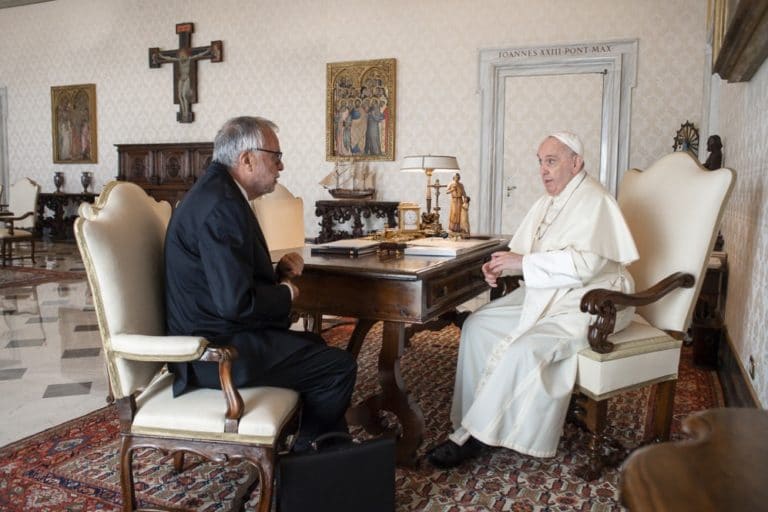Andrea Riccardi, the founder of Sant’Egidio Community, commented on Pope Francis’s appeal, during the Angelus, for prayer and fasting to intercede for peace in Afghanistan. “If small groups can sow terror, small groups can sow peace.”
In an interview with “Vatican News,” published today, Tuesday, August 31, 2021, Riccardi pointed out that to “pray and fast is absolutely not an anachronistic practice, and much less so spiritualist. On the contrary, I believe we pray too little for peace in our churches. On Sundays, we hardly hear prayers for Afghanistan or, for instance, for the North of Mozambique with 800,000 refugees, or for so many forgotten wars.”
“We pray little for peace, whereas we should have in our hands every day a Rosary with the names of all the countries at war, to pray for them. Prayer is a force,” said the Founder.
Meeting with the Holy Father
Sant’Egidio Community reported on its Website that yesterday morning the Pontiff received Andrea Riccardi in audience. The meeting took place on the eve of the feast of Sant’Egidio, which is celebrated on September 1.
It seems that during the meeting they talked about the fight against the growing poverty and the need to give adequate answers to all the problems that have arisen due to the COVID-19 pandemic, including the suffering of many families, of the elderly, and of other fragile people of the society.
Here is the full interview of “Vatican News” with Andrea Riccardi.
* * *
It’s not the first time that the Pope, in face of humanitarian tragedies, appeals to believers and others to come together in universal prayer. In your opinion, in these emergency situations, in which the work to be done is enormous, why is there the urgency to launch these, so to speak, “marathons of prayer and fasting?
In face of distant wars, in face of situations that we don’t know how to resolve, it seems we can do nothing, a sense of impotence is created, and then, from the sense of impotence, indifference arises. It’s what the Pope called in his address on Lampedusa a “globalization of indifference.”
In the global world, in fact, we see everything; images and news arrive about everything, but then we remain indifferent because we feel we can’t do anything. What can I do, a small man or woman, in face of Afghanistan, if the United States itself doesn’t know what to do? Instead, I believe that, in this global world, every man and woman can do something. If small groups can sow terror, small groups can sow peace.
And they can do so through prayer that, together with fasting, which is also detachment from daily life, is a “revolt” against war, as an invocation to the Lord, the Lord of history, that he may open paths of peace and, through His Spirit, arouse the goodwill of men, of the powerful, of institutions.
The Pope has always invited brothers and sisters of other religious Confessions to join him. Of what value are these initiatives of the Pope for Catholics?
I was present in Bari during the meeting for peace in July of 2018 with the Patriarchs and Heads of the Churches of the Middle East, which called my attention very much, because the Pope invited Christians to the unity of prayer — a purely evangelical image. An agreement between “brothers” can move, can begin a story of peace.
Protestant theologian Karl Barth, not at all at ease with religious intimacy, used to say that our prayer can change God’s Will, direct the history of which God is Lord in a new way. This involves all Christians of course, including those of other religions, because peace is a value of all religions.
God’s name is peace; it is so in Catholicism, in Islam, in the Oriental Religions or, if I think of the great common patrimony, such as the Psalms, in Judaism. It’s the Spirit of Assisi, the invitation to prayer for peace, that revolutionary and decisive lead introduced in 1986 by John Paul II: to pray together for others, not against others.
The Pope received you in private audience yesterday morning. Did you talk about the situation in Afghanistan? Did the Pope share a concern or thought with you?
The Pope is profoundly concerned about Afghanistan; he follows the situation day by day, but he hasn’t abandoned the dream and the vision — and we have already talked about it — of building a new post-COVID world, in which social solidarity goes hand in hand with international solidarity. Fratelli Tutti is the Magna Carta and the spirit with which this post-COVID society is built.
We live with too many emotions linked to the news, often forgetting that we are really in a historic phase of great changes, in which it’s urgent to build a world that is different from the previous one. And now we are facing a drama such as that of Afghanistan, which calls for spiritual and concrete solidarity in hospitality
We must ask ourselves, what type of society do we want to build? The societies of walls and fear or the societies of hope and hospitality? Hope and hospitality are fed in prayer because to pray makes us daring and also capable of thinking of new ways of coexistence.
Translation by Virginia M. Forrester










